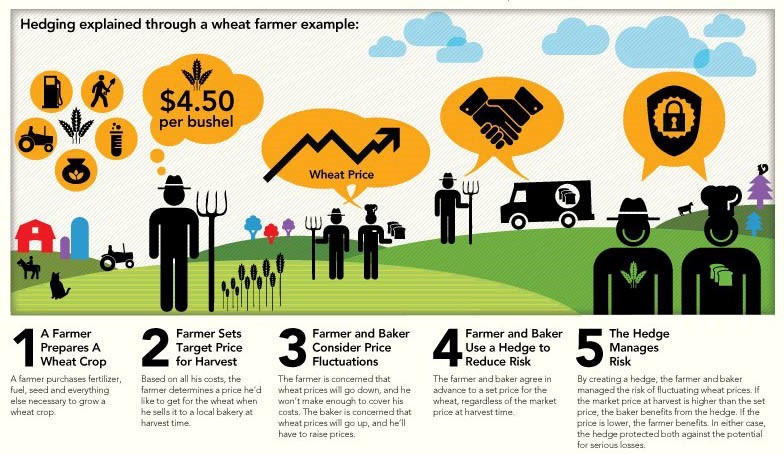DEFINITION:-
“ Market in which participants can buy & sell commodities & their future delivery contracts. A future market provides a medium for the complementary activities of hedging & speculation, necessary for damping wild fluctuations in the prices caused by gluts & shortages.”
Future markets are places (exchange) to buy & sell futures contract. There are several futures exchanges. Common ones include The New York Mercantile Exchange, The Chicago board of trade, The Chicago Mercantile Exchange, The Chicago Board of Options Exchange, The Chicago climate Future Exchange, The Kansas city Board of trade & The Minneapolis Grain Exchange.
A future contract is a financial contract giving the buyer an obligation to purchase an asset (and the seller an obligation to sell an asset) at a set price at a future point in time. The assets often underlying futures include commodities, stocks & bonds. Grain, precious metals, electricity, oil, orange juice & natural gas are traditional examples of commodities, but foreign currencies, emissions credits, bondwidth & certain financial instruments are also part of to day’s commodity markets.
Futures exchanges do not set the prices of futures contracts or their underlying traded commodities. Rather, supply & demand determines the prices. But two things in particular ensure the stability & efficiency of futures markets: Standardized contract & the presence of clearing members.
Standardized contracts mean that every futures contract specifies the underlying commodity quality, quantity & delivery so that the prices mean the same thing to everyone in the market.
Clearing members manage the payments between buyers & seller. They are usually large banks & financial services companies. Clearing member guarantee each trade & thus require traders to make good- faith deposits (called margins) in order to ensure that the trader has sufficient funds to handle potential losses & will not default on the trade. The risk borne by clearing members lends further support to the stability of further markets.
ADVANTAGES:-
- The commission charges for future trading are relatively small as compared to other type of investment.
- Futures contracts are highly leveraged financial instruments which permit achieving greater gains using a limited amount of invested funds.
- It is possible to open short as well as long positions. Position can be reversed easily.
- Lead to high liquidity.
DISADVANTAGES:-
- Leverage can make trading in futures contracts highly risky for a particular strategy.
- Futures contract is standardized product & written for fixed amounts & terms.
- Lower commission costs can encourage to trader to take additional trades & lead to over trading.
- It offers only a partial hedge.
- It is subject to basis risk which is associated with imperfect hedging using future.
THERE ARE TWO KINDS OF PARTICIPANTS IN FUTURE MARKETS:
- HEDGERS
- SPECULATORS
1.HEDGERS
Farmers, manufactures, importers & exporters can all be hedgers. Hedging is done to manage price risk. Hedgers wish to protect themselves from unfavorable price movement by for going a profit if the prices moves in their favor. There are different reasons why hedging might be undertaken. A wheat farmer can hedge against a possible price decline in the future & on the other hand cookie maker can hedge against an increase in the price of wheat in the future. A lender can hedge against a possible decline in the interest rate, whereas a borrower can hedge against a possible increase in the interest rate. To hedge, you either have the underlying commodity or you require the underlying commodity at some point in the future.
Eg.

2) SPECULATORS
The other part of futures market is made of speculators. They provide liquidity to the market. If a farmer wants to short sell a contract for 5,000 bushels of wheat expiring in 3 months it is highly unlikely that he will immediately find another consumer who wants to long buy a similar amount of wheat at the same time. The speculators, although they do not have any interest in the underlying asset or commodity, still buy the contract looking to profit through ideal market timings. This helps the entire system by bringing in much needed liquidity.
Future markets are standardized contracts between buyer & sellers. In this all terms & conditions are same for a buyer & seller. In this contract, margin & lot size have been already decided. We only have to decide how much lot (quantity) & at what rate (price) we have to buy. In this there are 3 contracts available to trade. Last Thursday of the month is the expiry of that month of contract.
| Contract | Expiry |
| Near month contract | Last Thursday ex.24Nov.2016 |
| Middle month contract | Last Thursday ex.29Nov.2016 |
| Far month contract | Last Thursday ex.25Nov.2017 |
Eg:
To trade in future market you need 10 to 20% margin of the contract value.
Contract value = CMP * Lot Size
SBIN CMP = 250
Lot size = 3000
Contract value = 250*3000
10% margin = 75000/-
If we buy SBIN @250
Sell SBIN @255
Profit per share = 5Rs.
Lot size = 3000
Total profit = 15000/-
Means we pay a margin of 75000 & do a turnover of 75000 & we get benefited of Rs.15000/-. We earned 20% profit on the margin used.

